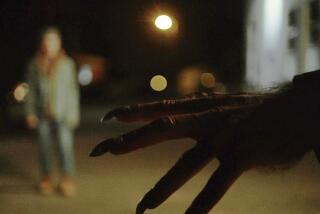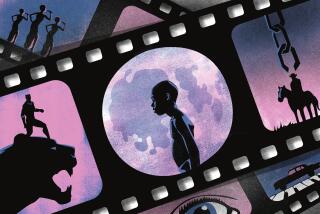Anthony Mann’s ‘The Furies’
IT HAS been a good DVD year for Anthony Mann (1906-67), a longtime critics’ favorite often considered one of Hollywood’s most underrated directors.
Mann’s relatively low name recognition might have something to do with the ease with which he slipped from one genre to another. He ended his career as the creator of handsomely mounted road-show epics such as “El Cid” (1961) and “The Fall of the Roman Empire” (1964), both of which the Weinstein Co. released in special collector’s editions this year. But he started at the opposite end of the spectrum, a director of stylized, subtext-rich B-noirs (“Desperate,” “T-Men,” “Raw Deal”) in the 1940s.
In the 1950s Mann embarked on what many consider his greatest period, making a string of westerns, generally shot on location and often starring James Stewart. One of these, “Winchester 73” (1950), is included in Universal’s recently released collection of Stewart westerns.
Last month MGM also issued a new version of Mann’s 1958 western, “Man of the West,” with an aging Gary Cooper, and this week, Criterion releases one of his earliest and most idiosyncratic forays into the genre, 1950’s adaptation of a Niven Busch novel, “The Furies” (a new printing of which is included in the typically sumptuous Criterion set).
In truth, “The Furies,” frontier setting notwithstanding, barely counts as a western. There are elements of film noir in both the plot and the look; many key scenes unfold under cover of darkness (Victor Milner earned an Oscar nomination for his moody cinematography).
Above all, though, it plays like a Freudian melodrama, dissecting the hysterical and ultra-competitive love-hate relationship between widowed patriarch T.C. Jeffords ( Walter Huston) and his headstrong daughter, Vance ( Barbara Stanwyck).
The Furies is the name of the family ranch, and it also aptly refers to the Greek goddesses of revenge, but the most relevant mythological figure here is Electra, for whom the psychological complex is named.
While T.C. is a blustery megalomaniac, Vance is a no-nonsense spitfire who inspires from the men around her a series of colorful animal metaphors; she’s referred to variously as a “she-fox,” a “filly who never had a rope on her” and “cattle all set to stampede.” Her daddy issues are signposted in the very first scene, in which she’s seen occupying the forbidden sanctum of her late mother’s bedroom.
The intense father-daughter relationship, characterized by jostling one-upmanship and uncomfortably intimate back rubs, quickly sours when Vance falls for a gambler (Wendell Corey) who holds T.C. responsible for his father’s death. T.C. disapproves so strongly of Vance’s choice of suitor that he basically pays him to go away. But when he brings home a new lady friend ( Judith Anderson), who -- in a great unspoken joke -- looks like an older version of Vance, it’s the daughter’s turn to flip her lid. After the near-camp moment when a wrathful Vance flings a pair of scissors at her stepmother-to-be, the standoff escalates into all-out war.
In a lengthy 1957 interview with the influential French journal Cahiers du Cinema, reprinted in the accompany- ing booklet, Mann says he detected affinities between “The Furies” and Dostoevski’s “The Idiot.” Robin Wood, in his booklet essay, draws comparisons to “King Lear,” a longtime fixation of Mann’s (“Man of the West” bears a resemblance to “Lear,” and he planned, but never made, a faithful version called “The King”). On the commentary track, the historian Jim Kitses suggests another Shakespearean reference point: “The Taming of the Shrew.”
Whatever the literary provenance, it’s a sensational showcase for the two well-matched leads. Huston, in his last performance (he died shortly before the movie’s release), is a font of entertaining bombast. But in the end, inevitably, the film belongs to the inimitable Stanwyck. As in so many of her films, she plays a somewhat ridiculous man-eating cliché to the hilt without sacrificing an ounce of her wit, charm or mystery.
More to Read
The biggest entertainment stories
Get our big stories about Hollywood, film, television, music, arts, culture and more right in your inbox as soon as they publish.
You may occasionally receive promotional content from the Los Angeles Times.






